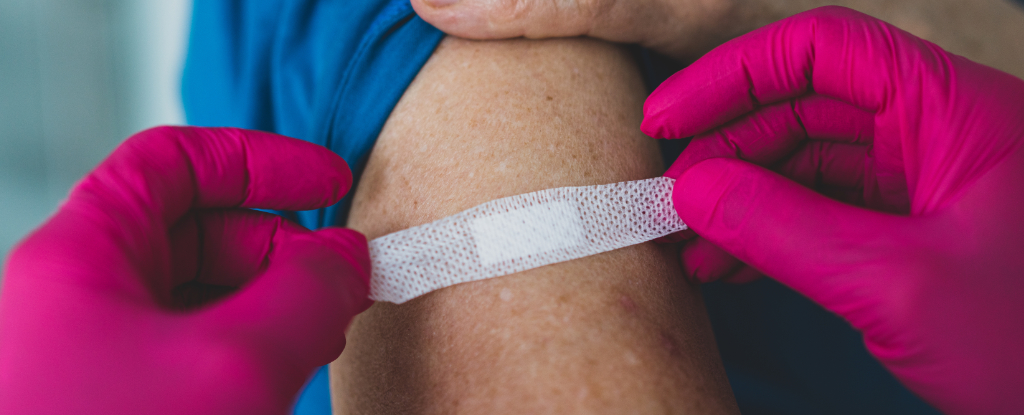a Recent Research He suggested that Shingrix, a relatively new vaccine given to protect older people against shingles, may have the potential to delay the onset of dementia.
This may seem like a strange connection, but in fact the study An older version of the shingles vaccine, Zostavax, has previously been shown to reduce the risk of dementia.
The new study, published in the journal Neurology last week, Nature MedicineBritish researchers found that Shingrix delayed the onset of dementia by 17 percent compared with Zostavax.
So how did researchers figure this out, and how does the shingles vaccine affect dementia risk?
From Zostavax to Shingrix
Shingles is a viral infection caused by the varicella zoster virus. virus. it is Painful rashIt particularly affects the elderly.
Previously, Zostavax was used as a vaccine against shingles, and a single injection provided good protection for about a week. 5 years.
The Shingrix vaccine is based on new vaccine technology that is thought to offer stronger and longer-lasting protection and is a two-dose vaccine that is now the recommended shingles vaccine option in Australia and elsewhere.
Shingrix will replace Zostavax in November 2023. National Immunization ProgrammeThis will provide the vaccine free of charge to people at highest risk of complications from shingles, including all adults over 65, Indigenous people over 50 and younger adults with certain medical conditions that affect the immune system.
What the study found
Shingrix is approved by the U.S. Food and Drug Administration. October 2017Researchers in the new study used the transition from Zostavax to Shingrix in the United States as an opportunity to conduct their research.
The researchers selected 103,837 people who received Zostavax (from October 2014 to September 2017) and compared them with 103,837 people who received Shingrix (from November 2017 to October 2020).
An analysis of data from electronic health records found that people who got Shingrix had a 17 percent longer “diagnosis-free interval” over the follow-up period (up to six years after vaccination) compared with those who got Zostavax, equating to an average of 164 more days without a dementia diagnosis.
The researchers also compared the shingles vaccine with other vaccines. influenzaa combination vaccine for tetanus, diphtheria, and whooping cough. Shingrix and Zostavax performed about 14 to 27 percent better in reducing the risk of a dementia diagnosis, with Shingrix showing a greater improvement.
The benefit of Shingrix in terms of dementia risk was more pronounced in both men and women, but more pronounced in women. This is not at all surprising, because women Higher risk An interplay of biological factors can increase the chance of developing dementia, including increased susceptibility to certain genetic mutations linked to dementia and hormonal differences.
Why Link?
The idea that vaccination against viral infections could reduce the risk of dementia has been around for more than 20 years, and the association Observed The relationship between diphtheria, tetanus, polio, and influenza vaccines and subsequent dementia risk.
According to the study, the Zostavax vaccine Mitigate the risks They are 20 percent less likely to develop dementia than unvaccinated people.
However, the vaccine itself may not prevent dementia, but rather may have this effect through the resulting elimination of viral infections, as research has shown that bacterial and viral infections in the gut are associated with dementia. Higher risk of dementia.
In particular, untreated infection with the herpes simplex virus, which is closely related to the varicella zoster virus that causes shingles, Significantly increase Risk of developing dementia. Studies have also shown that shingles may increase the risk of being diagnosed with dementia later in life.
The mechanisms are not fully understood, but there are two pathways that could help us understand why infection increases the risk of dementia.
First, while a fetus is developing in the womb, certain molecules are produced to help the body develop. These molecules can cause inflammation and accelerate aging, so production of these molecules is suppressed around the time of birth. However, viral infections such as shingles can also cause inflammation. Reactivate These molecules may be produced during adulthood, May lead to dementia.
Secondly, Alzheimer’s disease When you get the disease, a certain protein called amyloid beta goes out of control and kills brain cells. virus COVID etc. and Bad gut bacteria It may promote toxic forms of amyloid beta. In laboratory conditions, these proteins Hastening the onset of Of dementia.
What does this all mean?
As our population ages, the burden of dementia is likely to grow even greater in the future, and there is still much to learn about what causes the disease and what can be done to prevent and treat it.
This new study has some limitations. For example, an undiagnosed period doesn’t necessarily mean a disease-free period. Some people with delayed diagnoses may have underlying conditions.
While the study suggests Shingrix may have some discreet benefits, it is too early to suggest that an antiviral vaccine could be used to prevent dementia.
Overall, more research is needed to further explore the link between infections and dementia, which will help us understand the underlying causes of dementia and design potential treatments.
Ibrahim JavedEnterprise and NHMRC Emerging Leadership Fellow, UniSA Clinical and Health Sciences, University of South Australia
This article is reprinted from conversation Published under a Creative Commons license. Original Article.


